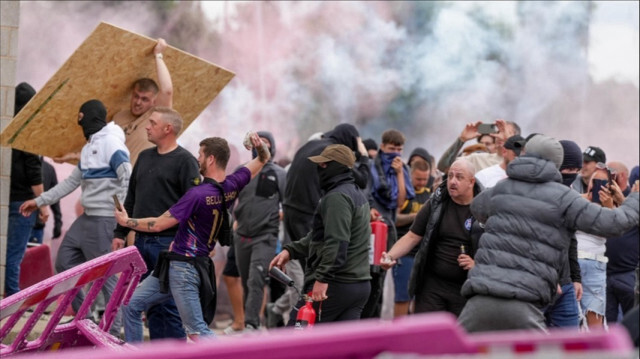
We are currently living in a time when Islamophobia has become routine: from microaggressions to genocide, from Gaza to Gujarat, from street thugs to billionaires, media outlets to governments: Muslim lives seem not to matter
The Islamophobic pogrom that swept through many parts of the United Kingdom (UK) came as a surprise. For many, including Muslims from France or Austria, England was seen as a haven of tolerance—a Muslim-friendly country where communities could practice their faith without interference from an Islamophobic state.
No one could have predicted how a false rumour that a 17-year-old “Muslim refugee” had murdered three young girls would trigger such violence. The accused, however, was neither Muslim nor a refugee but a Christian born in the UK. But if the perpetrator had been Muslim, would that have justified attacking mosques, looting Muslim shops, beating random people of colour, and displaying slogans that insult the Prophet (pbuh) and Islam?
- What caused the pogrom?
A key feature of all forms of racism is how an individual is seen to represent an entire community. Islamophobia is not only present in acts of violence against perceived expressions of Muslimness but also in the conditions that make such violence thinkable. A false rumour may have triggered the pogrom, but it was not the cause.
We are currently living in a time when Islamophobia has become routine: from microaggressions to genocide, from Gaza to Gujarat, from street thugs to billionaires, media outlets to governments: Muslim lives seem not to matter. If we focus solely on what is specific to this Islamophobic pogrom in Britain, we risk treating it as an isolated incident and obscuring its causes.
Islamophobia targets Muslimness because Muslims cannot be contained within the boundaries of any nation-state; they escape ethnonationalism and remind us of our common humanity because they represent, at their best, the possibility of imagining a people beyond racism. Whenever Islamophobes appear, whether in non-Muslim or Muslim countries, they first try to nationalise Islam. Whether it is governments in France or China or a hijabi woman in Türkiye demanding that Syrian refugees be forcibly repatriated, it is Islamophobia, and it is global.
The Islamophobic pogrom in Britain occurs in the midst of an ongoing genocidal assault on Gaza. Since Oct. 7th, the British establishment has described pro-Palestinian, anti-genocide protests as “hate marches,” condemning them as antisemitic while continuing to support genocide by a colonial-racial settler regime, offering it military and diplomatic backing.
The far-right thugs and their enablers have repeatedly recycled Tel Aviv's propaganda against Palestinians and Muslims. The dehumanization of Palestinians and the demonization of pro-Palestinian activists is the backdrop to the outburst of violent street Islamophobia that the world saw last week.
- Perpetrators and enablers
The perpetrators of pogroms are easy to identify: they are the people who do the burning, looting, and assaulting. But if we focus solely on the perpetrators of the pogrom and not its enablers, we neglect the collaboration between senior politicians and opinion-makers who have fostered a hostile environment for Muslims and refugees.
For example, in the midst of this pogrom, Robert Jenrick, a leadership candidate for Britain's main opposition party and potentially a future prime minister, said in a TV news interview that any Muslim saying "Allahu Akbar" should be immediately arrested.
The new Labour government continues to refuse to engage with the Muslim Council of Britain—the largest Muslim representative organisation. The Labour Party, like much of the British establishment, is capable of identifying antisemitism, even in homoeopathic traces, yet remains unwilling to unambiguously label attacks on mosques, the harassment of hijab-wearing women, and violence against those perceived to be Muslim as Islamophobia. They have no words for it.
Islamophobia, however, is not just a matter of words. It is a concept that allows us to make sense of what is happening; without it, we cannot see what drives the violence and violations against Muslims. Since the late 1980s, a growing number of European politicians and opinion shapers have drawn equivalences between Muslims, migrants, and Marxists, with the aim of a new social contract informed by the Great Replacement conspiracy, in which it is assumed that European populations are being replaced both demographically and culturally by foreigners, (and Muslims are the most foreign of all foreigners). It is these ideas, repeated decade after decade by successive governments, opinion-shapers, media outlets, and social media influencers, that have fuelled the Islamophobic pogrom in Britain.
The most hopeful outcome of the Islamophobic pogrom in Britain was how it was humiliated by popular mobilisations. Muslims, non-Muslims, people of colour, those on the Left, and others who reject racism—despite decades of Islamophobic propaganda—took to the streets in large numbers, outnumbering the far-right stormtroopers and silencing their cheerleaders and apologists.
These counter-protests, often with Palestinian flags prominently displayed, showed that Islamophobia is not inevitable; it can be defeated. The Palestinian flag has become a symbol not only of a Free Palestine but also of anti-colonial, anti-racist, and anti-Islamophobic resistance.

